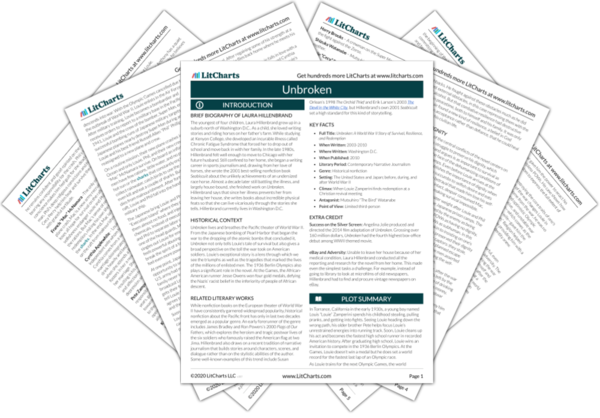Summary
Analysis
In the summer of 1954, Louie opens the California Victory Boys Camp. It is a summer camp for “lost boys” who have a history of delinquency, not unlike Louie’s own. When not with his campers, Louie travels the country, talking about his experiences in the war. Ever since that day in the Graham’s tent, he remains cheerful, pleasant, and hopeful.
Louie’s redemption is a continuous journey filled with compassion, faith, and a desire to help others. When he was a boy, Phil helped guide him to redemption in the eyes of his town. Now, Louie lives up to his promise to God and gives back to his community by doing for others what Phil did for him.
Themes
In 1996, Louie, in his late seventies, accepts an offer to run in the 1998 Winter Olympics in Japan. A television producer, Draggan Mihailovich, who is making a film on his life tells Louie that the Bird is still alive.
Finally, after 62 years, Louie gets his chance to run in the Olympics in Japan. Louie found it easy to forgive the Bird when he thought the Bird was dead. His final challenge is whether he can forgive the Bird when it turns out the Bird is still alive.
Themes
After the Japanese announced his death, Watanabe spent several years working as a farm hand. In 1952, he read a newspaper article about how the Japanese government had issued a pardon for him and the other war criminals. With the rise of Communism in the Far East, the United States wanted to strengthen its relationship with Japan so they dropped the charges against the war criminals. When the Bird returned to his family in Tokyo, they received him with open arms. The Bird told his family that he felt like a victim of war, that he had committed no crime.
While Louie comes to terms with his past, the Bird still lives trapped by immorality and delusion – he is either evil to the core and cannot even comprehend the magnitude of his crimes or he has so repressed his guilt that he actually sees himself as victim. Louie couldn’t see that he needed redemption until he found God, so perhaps the Bird also needs a sort of epiphany or religious awakening to make him see the truth and confront the crimes of his past.
Themes
In the following years, Watanabe marries, has two children, and makes a small fortune by starting an insurance agency. In 1995, in his mid-seventies, the Bird feels ready to publically discuss his role as a prison guard. Perhaps motivated by guilt or the narcissistic hope that he would be admired for having the “courage” to talk about the war, he gives an interview to a British newspaper. The Bird apologizes for being “strict” with the prisoners and says that the war made him cruel. He also invites his former captives to punch him in the face if they still feel angry.
If this story were fictional, we might expect the author to conclude the story with the Bird getting what’s coming to him. But, in reality, instead of suffering any consequences for his actions, he actually seems to live a pretty good life. This may seem unjust, but there is a suggestion in the book that the Bird does miss out on the inner fulfillment and serenity of finding redemption that Louie experiences. Though we don’t know the Bird’s true motives for giving the interview, his offer to the former POWs shows that he is still a violent man at heart – he still believes that violence, rather than compassion and forgiveness, is the answer to letting go of one’s anger and humiliation.
Themes
Get the entire Unbroken LitChart as a printable PDF.

At Louie’s request, Mihailovich tries setting up a meeting between him and the Watanabe during the Olympic Games, but the Bird refuses. Unable to offer his captor forgiveness, Louie writes him a letter where he details how the Bird’s actions made his postwar life a nightmare, but that the Christianity gave him the strength to forgive him. He also urges the Bird to convert. Louie gives the letter to someone to give to the Bird. If Watanabe received it, he never replied.
Louie’s faith withstands the injustice that the Bird never suffered any punishment for his crimes. Rather than dwelling on this injustice, Louie offers the Bird forgiveness, knowing that it’s the only way he can move past the war. Louie’s suggestion that the Bird convert also reveals Louie’s strong conviction that religion—and specifically Christianity—is the only way for people, no matter their crimes, to find redemption for their past sins.
Themes
In January 1998, Louie runs with the Olympic torch past the former Naoetsu prison camp. All around him, Japanese civilians smile and cheer him on. As he runs past his former prison, he has no bad memories of the war or of the Bird. He feels only joy.
Louie not only made it out of the camp alive, but also survived the psychological toll of war through a resilience founded in a belief in God. The book concludes not just with Louie’s survival but with his achievement of his initial goal: to run in the Olympics in Japan. No longer dwelling on the past, he is finally, utterly, free.
Themes












